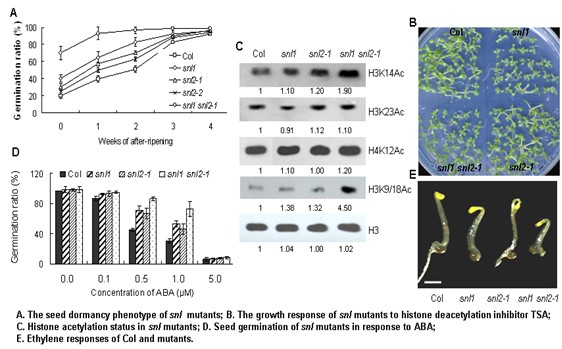SIN3 acts as a scaffold protein recruiting histone-binding proteins RbAp46/RbAp48 and HDAC1/HDAC2, which deacetylates the core histones resulting in a transcriptionally repressed state of the chromatin. It is essential in Drosophila and mouse, as sin3 mutants die during early stage of development. However, little is known about the importance of the SIN3-LIKE (SNL) protein family in growth and development of plants. Prof. Yongxiu Liu’s group from Institute of Botany, Chinese Academy of Sciences shows strong genetic evidence for a redundant function of SNL1 and SNL2 in the regulation of seed dormancy in Arabidopsis (Wang et al. Plant Cell 2013 25:149-166). The results also indicate that SNL1 and SNL2 could act as components of the HDAC-SNL complex to modulate the transcription of genes involved in the ethylene and ABA pathways by modifying their histone acetylation abundance. Enhanced ABA-ethylene antagonism in the snl mutants results in altered seed dormancy.
The study has been published online in Plant Cell. This project was supported by the National Natural Science Foundation of China.
SIN3 acts as a scaffold protein recruiting histone-binding proteins RbAp46/RbAp48 and HDAC1/HDAC2, which deacetylates the core histones resulting in a transcriptionally repressed state of the chromatin. It is essential in Drosophila and mouse, as sin3 mutants die during early stage of development. However, little is known about the importance of the SIN3-LIKE (SNL) protein family in growth and development of plants. Prof. Yongxiu Liu’s group from Institute of Botany, Chinese Academy of Sciences shows strong genetic evidence for a redundant function of SNL1 and SNL2 in the regulation of seed dormancy in Arabidopsis (Wang et al. Plant Cell 2013 25:149-166). The results also indicate that SNL1 and SNL2 could act as components of the HDAC-SNL complex to modulate the transcription of genes involved in the ethylene and ABA pathways by modifying their histone acetylation abundance. Enhanced ABA-ethylene antagonism in the snl mutants results in altered seed dormancy.
The study has been published online in Plant Cell. This project was supported by the National Natural Science Foundation of China.

SIN3 acts as a scaffold protein recruiting histone-binding proteins RbAp46/RbAp48 and HDAC1/HDAC2, which deacetylates the core histones resulting in a transcriptionally repressed state of the chromatin. It is essential in Drosophila and mouse, as sin3 mutants die during early stage of development. However, little is known about the importance of the SIN3-LIKE (SNL) protein family in growth and development of plants. Prof. Yongxiu Liu’s group from Institute of Botany, Chinese Academy of Sciences shows strong genetic evidence for a redundant function of SNL1 and SNL2 in the regulation of seed dormancy in Arabidopsis (Wang et al. Plant Cell 2013 25:149-166). The results also indicate that SNL1 and SNL2 could act as components of the HDAC-SNL complex to modulate the transcription of genes involved in the ethylene and ABA pathways by modifying their histone acetylation abundance. Enhanced ABA-ethylene antagonism in the snl mutants results in altered seed dormancy.
The study has been published online in Plant Cell. This project was supported by the National Natural Science Foundation of China.
SIN3 acts as a scaffold protein recruiting histone-binding proteins RbAp46/RbAp48 and HDAC1/HDAC2, which deacetylates the core histones resulting in a transcriptionally repressed state of the chromatin. It is essential in Drosophila and mouse, as sin3 mutants die during early stage of development. However, little is known about the importance of the SIN3-LIKE (SNL) protein family in growth and development of plants. Prof. Yongxiu Liu’s group from Institute of Botany, Chinese Academy of Sciences shows strong genetic evidence for a redundant function of SNL1 and SNL2 in the regulation of seed dormancy in Arabidopsis (Wang et al. Plant Cell 2013 25:149-166). The results also indicate that SNL1 and SNL2 could act as components of the HDAC-SNL complex to modulate the transcription of genes involved in the ethylene and ABA pathways by modifying their histone acetylation abundance. Enhanced ABA-ethylene antagonism in the snl mutants results in altered seed dormancy.
The study has been published online in Plant Cell. This project was supported by the National Natural Science Foundation of China.

